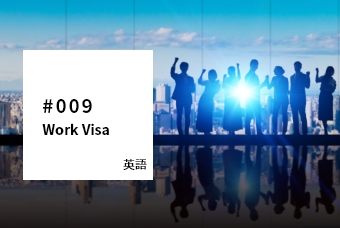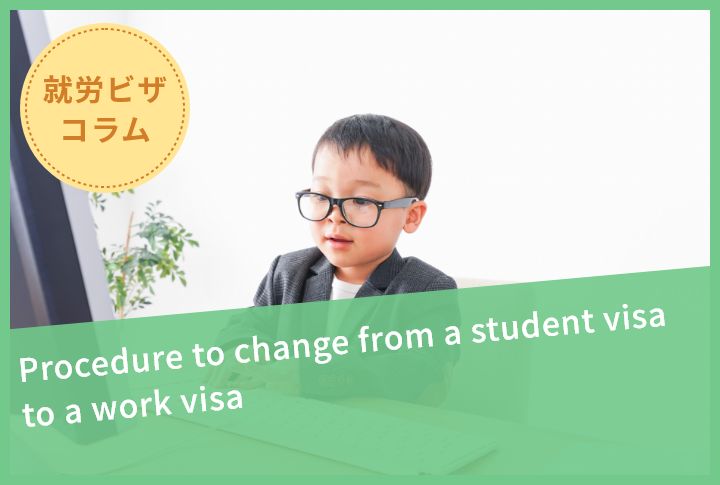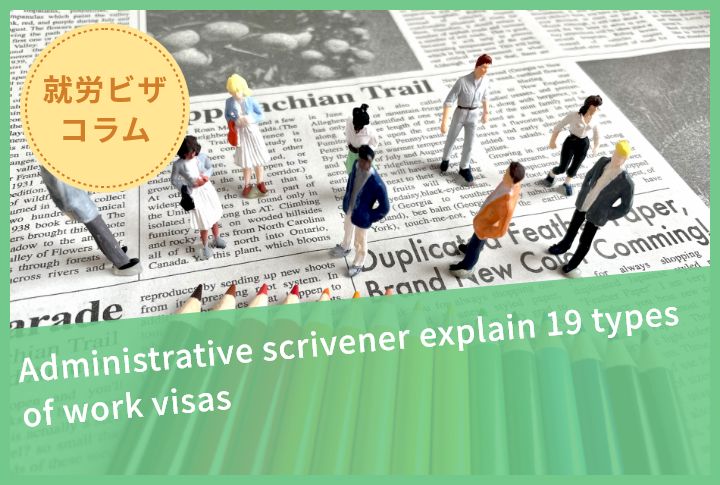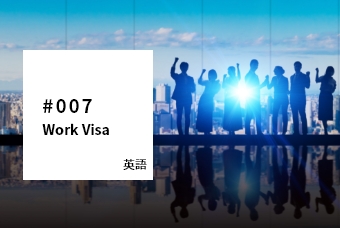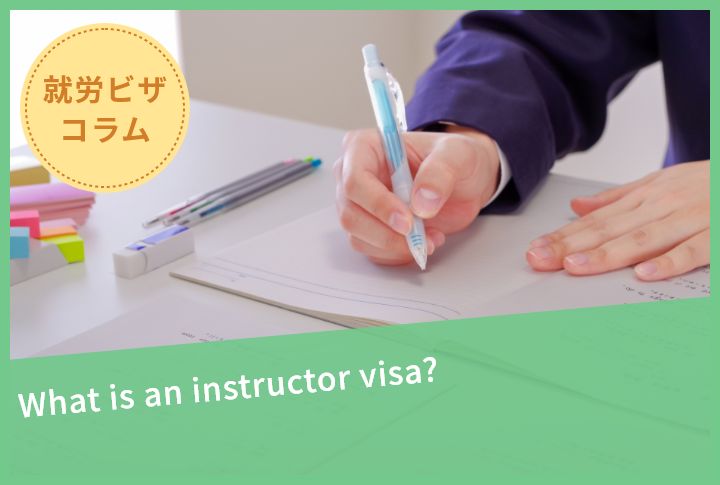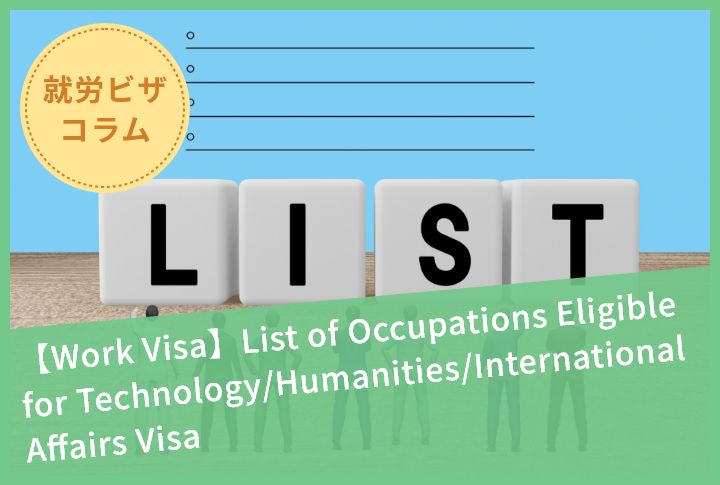What is the crime of promoting illegal work, which is charged even when committing it without knowing it?
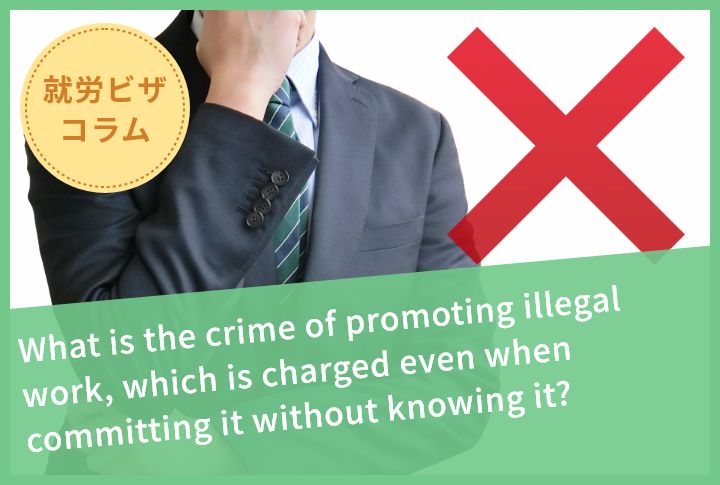
The crime of promoting illegal work is charged when a company let their employees work illegally.
Administrative scriveners specializing in immigration matters will thoroughly explain, with some examples, the crimes of promoting illegal work, which companies employing foreigners should know.
In this article, we will describe the responsibility of the “company side.”
If you would like to know the responsibility of foreigners, please read “What is the crime of engaging in an activity other than that permitted under the status of residence previously granted, which is charged when engaging in such activity? ”
Index
1. What is illegal work activity?
To understand the crime of promoting illegal work, you need to understand what illegal work activities are.
Therefore, we will explain illegal work activities in this section.
Did you know that there are actually various types of illegal work?
In the website of the Immigration Services Agency of the Ministry of Justice, the following 3 types are listed as the different types of illegal work.
(1) Illegal immigrants or foreigners subject to deportation work in Japan.
(Example)
・People who have smuggled themselves into Japan or people whose period of stay has expired work in Japan.
・People whose deportation has been already decided work in Japan.
Probably, these cases are similar to the general image of illegal work.
This type is applicable when foreigners who illegally stay in Japan (overstayers, etc.) work in Japan.
In addition to overstayers, foreigners who have illegally entered or landed in Japan, etc. are included in this type.
(2) Foreigners work without permission from an immigration office.
(Example)
・People entered Japan for the purpose of a temporary stay (such as sightseeing) work in Japan.
・International students or those who have applied for refugee status work in Japan without getting permission.
Foreigners who entered Japan with a temporary visitor visa for sightseeing or visiting relatives are not permitted to engage in activities that involve income. This is because the Immigration Act prohibits working with a temporary visitor visa.
In addition, foreigners with a student visa or dependent visa are prohibited from working in principle. They cannot work unless they obtain permission to engage in activity other than that permitted under the status of residence previously granted (permission for a part-time job).
If a foreigner violates this rule and engages in work activities, such activities will fall under illegal work activities.
(3) Foreigners work beyond the range approved by an immigration office.
(Example)
・Foreigners who are permitted to work as a chef of foreign cuisine or language school teacher work as unskilled workers at factories or offices.
・International students work more than the permitted hours.
The number of exposures of this type of cases has been increasing.
This one is so important that we will explain the above examples one by one.
○Foreigners who are permitted to work as a chef of foreign cuisine or language school teacher work as unskilled workers at factories or offices.
Under the status of residence system in the Immigration Act, work visas for foreigners are categorized by contents of activities, so you need a skilled labor visa to work as a chef and an engineer/specialist in humanities/international services visa to work as a language school teacher, and so on.
In short, if a foreigner has obtained a skilled labor visa to work as a chef, he/she is not allowed to receive rewards for conducting any activity that exceeds the range permitted by the skilled labor visa in the Immigration Act.
An example of breaking such rule is the first case above.
○International students work more than the permitted hours.
Next, let’s look at the second case above.
As mentioned earlier, international students with a student visa cannot work in principle. However, although there are certain restrictions on type of occupation and hours, international students can engage in work activities by obtaining permission to engage in activity other than that permitted under the status of residence previously granted (permission for a part-time job).
In this case, a person who has a student visa has engaged in a part time job exceeding the permitted working hours (28 hours per week in principle).
What did you think?
You may have realized that illegal work activities may exist in our daily life.
In the next section, let’s look at the responsibilities that companies must bear for promoting illegal work activities.
2. What is the crime of promoting illegal work?
In the previous section, we have explained illegal work activities.
In this section, let’s look at the crime of promoting illegal work, which is charged when a company have a foreigner engage in illegal work activities.
The crime of promoting illegal work is stipulated in Article 73-2 of the Immigration Act.
Article 73-2 (1) A person falling under any of the following items is to be punished with imprisonment for not more than 3 years or a fine not exceeding 3 million yen, or is to be subject to the cumulative imposition of imprisonment and a fine:
(i) a person who has a Foreign National engage in illegal work in connection with business activities; or
(ii) a person who places a Foreign National under control of that person for the purpose of having the Foreign National engage in illegal work;
(iii) a person who arranges on a regular basis for a Foreign National to engage in illegal work or who makes arrangements for the act set forth in the preceding item.
(2) Omitted
○The meaning of “a person who has a Foreign National engage in illegal work in connection with business activities” in Article 73-2, paragraph 1, item (i)
The phrase “has (a Foreign National engage in illegal work)” here means that a person in a dominant position over a foreigner uses his/her position to encourage the foreigner to engage in illegal work activities.
A typical example such person is an employer who has hired a foreigner engaged in illegal work activities.
In addition, not only employers but also employees who are in a supervisory position can be deemed to have had a foreigner engage in illegal work.
○The meaning of “a person who places a Foreign National under control of that person for the purpose of having the Foreign National engage in illegal work” in Article 73-2, paragraph 1, item (ii)
The part it says “places […] under control of that person” in the item means cases where a subordinate-superior relationship has been established because a person places a foreigner working illegally under his/her pressure and influence.
One example is that a person has provided a place of residence, etc. to support personal life of a foreigner, and because of that, it is psychologically difficult for the foreigner to get out of their subordinate-superior relationship.
This item is also applicable when a foreigner is found to be in a state where he/she cannot get out of the subordinate-superior relationship as his/her boss keeps his/her passport or lends money to him/her.
○The meaning of “a person who arranges on a regular basis for a Foreign National to engage in illegal work or who makes arrangements for the act set forth in the preceding item” in Article 73-2, paragraph 1, item (iii)
An example of this item is brokers.
The part “on a regular basis” in above item is fulfilled when repeating or willing to repeat, and it does not mean to doing something to receive compensation although it sounds like it in the original Japanese version.
So far, we have seen the article which stipulates the crime of promoting illegal work.
By the way, do you see why companies are held liable for illegal work activities committed by foreigners, in the first place?
Companies benefits financially from illegal work activities. As such, companies are held responsible based on the Principle of Liability of an Entity Receiving Reward, which means that an entity which benefits shall also bear responsibility. Another purpose of punishing companies is to prevent illegal work activities.
In the next section, let’s look at the penalty on promoting illegal work.
3. Penalty on promoting illegal work
If a company is charged with the crime of promoting illegal work, it will be punished by imprisonment with work for not more than 3 years or a fine of not more than 3 million yen, (or both).
As said in the title of this article, “I didn’t know” does not work as an excuse for the crime of promoting illegal work.
For example, a company employs a foreigner with an engineer/specialist in humanities/international services visa and unintentionally makes the foreigner engage in activities which are not permitted by the visa (exceeding statutory activities) because the company has no knowledge of the Immigration Act. In such case, having no knowledge cannot be an excuse.
The same applies when, as a result of neglecting to carefully confirm, a company hiring part-timers misunderstands that a student has permission to engage in activity other than that permitted under the status of residence previously granted.
We hope you now understand that the crime of promoting illegal work is charged very severely, as you cannot use “I didn’t know” as an excuse.
4. What companies should do to avoid being charged with the crime of promoting illegal work?
As mentioned earlier, you are not exempt from the crime of promoting illegal work on the grounds of lacking knowledge.
Having said that, it is stipulated that companies are not charged with the crime of promoting illegal work if there is no negligence.
The meaning of no negligence is when all means that should be taken have been taken.
It’s abstract and confusing, isn’t it?
Here, let’s take a close look at what companies should do when hiring foreign human resources.
(1) Understand the Immigration Act correctly.
As mentioned earlier, work visas are categorized in accordance with activity types. If you do not know the exact scope of each visa, you cannot tell whether each activity is legal or illegal.
Receiving consideration for any activity exceeding the specified range of activities falls under illegal work activities.
Therefore, a correct understanding of Immigration Act is essential for the employment of foreign personnel.
(2) Check the validity of residence cards.
You can check the validity of numbers of residence cards and special permanent resident certificates in the following website provided by Immigration Services Agency.
(Reference site) The Immigration Services Agency, Inquiry about validity of numbers of residence cards, etc.
https://lapse-immi.moj.go.jp/ZEC/appl/e0/ZEC2/pages/FZECST011.aspx
Unfortunately, fake residence cards are going around, so checking with the above website is not sufficient to prove validity of residence cards, but it can possibly be a factor for companies employing foreigners to be found to have taken every means they should have taken.
Companies that employ foreign human resources are encouraged to make effective use of the above website and take measures such as saving confirmation results.
(3) Check residence cards and passports.
When hiring foreign personnel, be sure to check his/her residence card and passport.
There are several points to check, but the first thing to do is to check the column of “就労制限の有無 (i.e. whether or not there is a restriction on work)” on the front of the residence card. In case of hiring a part-timer, etc., please check the “資格外活動許可欄 (i.e. the column of permission to engage in activity other than that permitted under the status of residence previously granted) on the back of the residence card.
There is one thing to be careful here, which is that there are cases where judgement cannot be made based on the residence card alone. Specifically, such cases include cases of a specified skilled worker visa, designated activities visa, and technical intern training visa. For these visas, you need to check the specifications affixed to passports.
(4) Consult with an expert.
It is generally considered that foreigners who have a visa can work, but if they deviate from the statutory activities, it becomes illegal. Also, depending on the type of visa, hiring companies need to check passports or manage the hours of part-time jobs.
The important perspectives is not “whether a visa was obtained,” but “how to hire and manage foreign human resources.”
Even if a foreigner has a visa, depending on the subsequent management of the foreigner in the company, the foreigner may end up working illegally, by which the company bears a risk of being charged with the crime of promoting illegal work.
Utilizing experts of international matters to clarify ambiguities in the employment of foreigners is one way to ensure compliance with laws.
5. Summary
In this article, we have seen the crime of promoting illegal work, which companies are charged with.
When providing support to companies charged with the crime of promoting illegal work, we almost always hear this phrase:
“We never expected this to happen… “
Every personnel of such companies says that.
By small misunderstanding and getting their wires crossed, companies may end up facing a situation where they have to pay a very high price.
When a company is charged with the crime of promoting illegal work, such company will bear not only legal responsibility, but also social responsibility. It will most likely be featured in the media, too.
The brand image and social credibility of the company will be greatly lost if it is reported as a company accused of promoting illegal work.
In order to avoid such situation, it is necessary for companies to take correct procedure when hiring foreigners.
“We want to hire foreigners.”
“But we don’t know where to start.”
“Currently we have foreign employees.”
“But we are not sure if our current way of employment and management are correct.”
If you have read this article and have such questions, please feel free to contact us.
We will advise you on how to establish the system of employing foreigners and more, to establish the management system of foreign employees.








